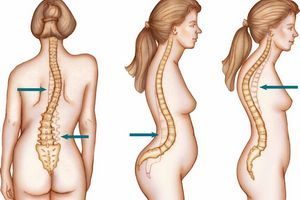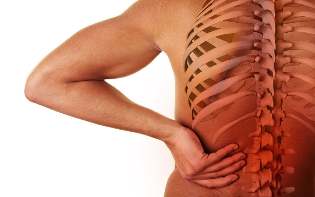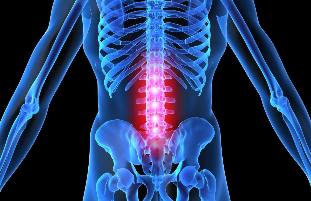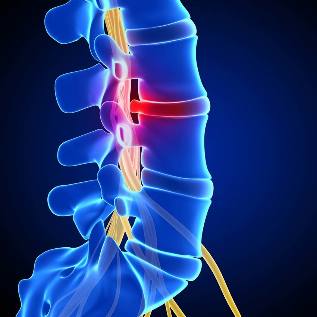The most common type of spine – lumbar osteochondrosis. The highest percentage of people suffering from lumbar degenerative disc disease falls on the age period after the age of 30. The disease is caused by cartilage degeneration of the spine and intervertebral discs. The disease is characterized by severe pain attacks in the lower back Department.

Causes of lumbar degenerative disc disease
The reasons why these diseases are acquired, most often, refer to the following:
- low intensity physical activity;
- thyroid disease, cardiovascular system, GASTROINTESTINAL tract;
- high physical activity, weightlifting;
- disease of the vertebral joints, in particular, has rheumatoid arthritis
- vertebral immaturity;
- flat feet ;
- spinal injuries, especially in have lumbar and cross Department;
- not the right metabolism;
- degeneration of the spine associated with age-related changes.
At risk of the disease lumbar degenerative disc disease includes people who:
- have curvature of the spine;
- overweight, disturbed metabolism;
- long in a bent position;
- have a hereditary predisposition;
- are in the environment of high stress;
- have sleep disorders, not getting enough rest;
- the body is subjected to hypothermia;
- are representatives of professions such as porters, builders, drivers, and also have the specialty associated with the constant presence at the computer.
Symptoms of degenerative disc disease of the lumbar
In addition to the pain I feel sick for degenerative disc disease of the lumbar, especially in times of heavy loads, also, there are other symptoms of the disease, which manifested in the following:
- dull pain, go from the inflammation in the leg;
- strengthening of pain when lifting heavy, change in body position, coughing, sneezing;
- with a long presence in the same position, blood accumulates in the hearth, and at the slightest attempt to change posture, there is a sharp pain;
- constant stress the back muscles;
- backache of the lumbar at the slightest hypothermia;
- numbness of the thigh, the gluteal muscles, the leg and foot;
- tingling sensation in the legs;
- arterial spasm to the point of pulseless;
- pathology sweaty glands;
- drying of the skin in the area of the source of pain and impaired sensation.

The main symptoms and signs of lumbar osteochondrosis in women
Osteochondrosis of the lumbar spine is a common disease characterized by degeneration of the intervertebral discs. Over time, as well as from the excessive loads they are gradually disappearing, become flat. It threatens to limit mobility and discomfort occurs due to samishisa vertebrae, which steal on the nerve roots, and vessels. Recognize the symptoms of lumbar osteochondrosis in women and signs you can use the suggested prompts.
Lumbar degenerative disc disease — causes, treatment, diagnosis
The lumbar is the part of the spine, which has a maximum load while jumping, running, walking, seats, to take power sports and in other situations. The lumbar consists of five vertebrae and is located between the sacrum and thoracic spine. When injury of the lumbar, at high loads on the spine, deformation of the intervertebral discs, destruction of the fibrous ring that supports the intervertebral disc, biochemical changes in cartilage, blood circulation. When rupture of the fibrous ring is protrusion of the intervertebral disc, the development of intervertebral hernia.

Osteochondrosis of the lumbar spine is a serious condition, accompanied by pain that spreads to the leg, lower back pain, complications. In the neurology Department usupovskiy the hospital the patient can get the advice of an experienced neurologist, to be diagnosed, to know the cause of the disease, to effective treatment and rehabilitation. In the Department of neurology are engaged in treatment of autoimmune disorders, circulatory disorders of the brain, chronic pain, consequences of traumatic brain injury, age-related diseases.
Osteochondrosis of the lumbar symptoms
The main symptom in osteoarthritis is the pain. The patient gets tired quickly, he often has headaches, worried about poor sleep, irritability. With the development of the disease the joints are the negative symptoms of the urinary system, increases the sensitivity of the feet, the skin on the extremities becomes dry, there are often m Azov spasms, for pain attack disturbed sweating.
Osteochondrosis of the lumbar spine characterized by deformation of the intervertebral discs change their shape, degeneration, dislocation, coracoid overgrowth of the vertebrae. With the development of osteochondrosis of lumbar Department there is a loss of flexibility of the spine, are irritated niinivaarantie nerves, sacral nerves, which form the sciatic nerve. Developing complications — sciatica. The cause for sciatica becomes compression of the nerve root in the lumbar spine, deformity of the intervertebral disc, their removal, the coracoid overgrowth of the vertebrae, intervertebral hernia. Sciatica is accompanied by severe pain, reduced quality of life.

With the development of lumbar degenerative disc disease connections are the following syndromes:
- pain.
- radicular syndrome.
- ischemic syndrome.
- vertebral syndrome
Expert opinion
The number of hospital visits degenerative-dystrophic spine diseases occupy the first place. According to statistics 60-80 % of cases, aggravation of degenerative disc disease leads to the development of temporary disability. In the structure of disability on the proportion of degenerative diseases account for 20 % of cases. Lumbar osteochondrosis is the most common localization of the pathological process. Doctors confirm that this disease accounts for 60-70 % of cases.
Diagnosis of pathology in the hospital occurs with radiographic studies, CT and MRI. Osteochondrosis dangerous complications. In severe cases lose the ability to self. Therefore, it is crucial to consult a doctor for examination and prescribing the right treatment. Depending on the extent of degenerative process in the lumbar vertebrae, the doctors develop an individual therapeutic plan. It includes a means of etiotropic, pathogenetic and symptomatic therapy. In addition, the treatment plan contains recommendations for the prevention of relapses.
Osteochondrosis of lumbar spine: treatment
Treatment of degenerative disc disease of the lumbar depend on the extent of the disease. Osteochondrosis has several degrees of development of pathology:

- easy degree of disease – the fibrous ring around the intervertebral disc has cracks that are filled with content of the nucleus pulposus. Discs at this stage of the disease deformed slightly, worried about the pain, which may be taken for the pain in the heart. There is pain in the lower back when lifting heavy objects and sudden movement. The pain may be steady or sharp, sudden.
- the process of deformation of the intervertebral discs continues. Is pinched nerve endings, reducing the gap between the vertebrae, the connection is marked discomfort in the lumbar area, often have pain attacks and discomfort in the lumbar region and sacrum.
- the third degree of development of lumbar degenerative disc disease is characterized by the rupture of the fibrous ring around the intervertebral disc, the extrusion of the nucleus pulposus, compression of the nerve roots and blood vessels – developed intervertebral hernia. The patient in this stage of the disease suffers from malfunction of the internal organs, becomes stooped.
- the fourth degree of the disease – severe stage of the disease. The deformation of the spine that leads to disability.
Severe disease often require surgical treatment after final deformation of the spine. Deformed spine bone overgrowth the patient impaired motor activity. Women and men the progression of the disease leads to disturbances in the functioning of the genitourinary system: in men, impaired potency, in women during pregnancy occurs deformation of the intervertebral discs suffer internal sex organs.
Vascular compression ischemia
Circulatory disorders of the spinal cord and additional peripheral structures leads to a "refinement" of the structure of the intervertebral discs and, accordingly, abnormal mobility of the spine, the formation of osteophytes and neoarthrosis.
Compressive myelopathy

The narrowing of the spinal canal, causing the periodic attacks of weakness in the limbs, painful "cross" syndrome of the lower back with the recoil on the back of the thighs. Against this background, growing malnutrition/hypotension calf/gluteal muscles, the disappearance of plantar, anal jerk and Achilles reflexes, paresis of the foot.
Treatment of degenerative disc disease of the lumbar
To treat the disease can and should be. Of course, in this case, only the complex therapy, which is aimed at reducing the symptoms of autoimmune disease, the restoration of the structure of the spine and the prevention of recurrence of the problem.
Complex therapy of these diseases includes:
- Receiving medication.
- Blockade injection.
- Exercises and physical therapy.
- Massage and manual therapy.
- Physiotherapy.
Drugs with lumbar osteochondrosis

- Painkillers.
- Reducing chondroprotectors.
- Vitamins. Optimal group B.
- Injection. Anesthetics, and are produced of cartilage and the normalizers of blood microcirculation.
- The local funds.
Gymnastics in osteochondrosis of the lumbar spine
An important element of the recovery of the spine. All treatments are designed individually, is aimed at relieving pain and muscle spasm, normalization of the circulation of blood, restoration of the intervertebral discs.
Massage in osteochondrosis of the lumbar
Massage is an obligatory component of complex therapy of the disease. It helps how to relax and to train the muscles of the soft bottom keeps, induces the repair process of cartilage, relieves pain. Most often in this disease, used medical, point, hardware, canned, vacuum and connective tissue massage.
Physiotherapy
As a rule, physiotherapy assigned patients with osteochondrosis of the lumbar spine only in remission of the disease, after overcoming the period of exacerbation of the problem. Modern and classical techniques:

- Acupuncture. The impact of special needles on the acupuncture points of the keeps.
- Stretching. The classical technique of stretching of the spine massage-traction couch produced by a qualified chiropractor.
- Electrophoresis. Known from 60-ies, comprehensive non-surgical method of treatment for external problem affected areas.
- Traction decompression. Automated hardware stretching of the spine on a special medical complex.
- Shock-wave therapy. The use of infrasonic waves for the treatment of osteoarthritis.
- Osteopathy. The integrated methodology combines elements of chiropractic, massage, and therapeutic Orthopaedics.
- Magnetopuncture. Direct exposure to an alternating magnetic field on the spine.
- Laser puncture. Treatment of acupuncture points with a beam-induced radiation.
- Electrical stimulation. The application of small alternating currents on the affected areas.
Prevention of lumbar osteochondrosis
After passing the comprehensive treatment and physical therapy, a long period of time is necessary supportive therapy: in this period, the spine still breaks and needs to be supported. In addition, prevention is intended to prevent the emergence of degenerative disc disease of the lumbar spine. Main activities:
- Regular balanced exercise, preferably under the supervision of a qualified podiatrist.
- Normalization of body weight quite often, a complicating factor influencing the formation of osteoarthritis, is overweight person.
- Correction of the diet. Regular diet must include foods rich in elements such as calcium and magnesium. It should exclude too fat and unhealthy meals, other food, not falling under the definition of healthy food.
- The rejection of bad habits. Alcohol and Smoking increase all destruction processes in the body, this also applies to the occurrence of osteochondrosis.
- The correct posture. Be sure to watch your posture, especially if your work is connected with the constant presence at the computer or other seated activity. Also note the child — like and how long it sits. Normal correct posture will allow you to prevent the onset of scoliosis and therefore further degenerative disc disease.
- Using the right shoes, clothes and accessories, denial of regular heavy lifting. Wrong shoes, heavy bitch on the shoulder, work as a loader all of these factors sometimes have decisive influence on the beginning of the formation of destructive processes in the spine.

































